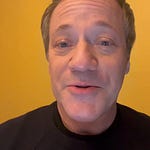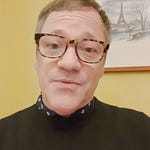I often use excerpts from books and poems as prompts. If a passage you read evokes a strong reaction from you, there’s a good chance it will evoke an equally strong piece of writing. You may have experienced this when writing in response to Lisa Wells’ excerpt from her book, Believers, in one of my previous posts.
Todays’s excerpt is from Christopher Vogler's, The Writer's Journey (3rd Edition). It’s an evocative piece of writing about the power of words, and about the way they can heal us (or hurt us). To utilize today’s prompt, see my short video above for guidance.
The Prompt (from page 294 of Vogler’s book):
Many cultures believed the letters of their alphabets were far more than just symbols for communication, recording transactions, or recalling history. They believed letters were powerful magical symbols that could be used to cast spells and predict the future. The Norse runes and the Hebrew alphabet are simple letters for spelling words, but also deep symbols of cosmic significance.
This magical sense is preserved in our word for teaching children how to manipulate letters to make words: spelling. When you “spell" a word correctly, you are in effect casting a spell, charging these abstract, arbitrary symbols with meaning and power. We say, “Sticks and stones may break my bones, but words can never hurt me," but this is manifestly untrue. We know that words have the power to hurt or heal. The simple words of a letter, telegram, or phone call can strike you like a hammer blow. They're just words—marks on paper or vibrations of air—but mere words such as, "Guilty," "Ready, aim, fire!" "I do," or "We'd like to buy your screenplay," can bind us, condemn us, or bring us joy. They can hurt or heal us with their magic power.
The healing power of words is their most magical aspect. Writers like the shamans or medicine men and women of ancient cultures, have the potential to be healers. Shamans have been called, “the wounded healers.” Like writers, they are special people set apart from the rest by their dreams, visions, or unique experiences. Shamans, like many writers, are prepared for their work by enduring terrible ordeals. They may have a dangerous illness or fall from a cliff and have nearly every bone broken. They are chewed by a lion or mauled by a bear. They are taken apart and put back together in a new way. In a sense they have died and been reborn, and this experience gives them special powers. Many writers come to their craft only after having been shattered by life in some way.
What I wrote in response:
Elizabeth Montgomery, star of the TV Show, Bewitched, 1964
As a child, I dreamed of being a witch. No doubt I was influenced by the wholesomely blonde and beautiful Elizabeth Montgomery on the sitcom Bewitched: she was a witch as well as a beautiful suburban parent with a big house: I wanted to be all those things too. But I knew nothing about witchcraft as a child. It would be decades before I discovered the nature-worshiping Wiccans when I was in college (and fell in love with a long haired, red headed Scot who hugged trees for a living). I knew nothing of actual spells during childhood, but when I was mad at him, and the tornado of 1978 tore the garage door off of Jimmy Coco's house, I secretly wondered if I had done that with my anger.
Words were always mine though, whether they were the first ones I read out loud from my Dr. Seuss books, or the ones I begged my siblings to read to me. Perhaps not surprisingly, the Wizard of Oz was a favorite, as was The Lion the Witch and the Wardrobe. I wrote a play in fourth grade, memorized an entire script in fifth grade, and began writing painful poems of unrequited love sixth grade, including one very revealing one in which I used the f-word, though I had no idea what it meant really, no matter how many times it was explained to me in clinical terms. Pop found that one, and it didn't go well.
Middle school was when I began to dream of publishing books, so I could somehow be a part of helping others escape and survive the cruelty of being othered (femmy, diminutive boy that I was). And of course, when adolescence finally came crashing down, words were all I had. I sang my heart out and read all the lyrics on those large album jackets, and I filled journals with longing and confusion, trying to tell and retell the story of watching my mother erode into the shell she would become. There were gory poems and sad vignettes in college about jumping into the grave with her (though she was still alive then), something I borrowed from the biography Sybil, brilliantly played by Sally Fields in a harrowing made for TV movie. I tried to own the darkness as a way of finding my way back to the light, and words were always the way.
They still are, I guess. They still are.







